An Australian robotics company has successfully deployed its technology in commercial trials at Sunnyspot Packhouse avocado facility in Queensland.
LYRO Robotics, based in Brisbane, say their world-leading picking and packing technology combines computer vision with machine learning. The robotic grasping mechanism can see an avocado coming down the line, make a decision on how to grasp the fruit correctly, pick it up and place it perfectly into the cardboard box.
"The most exciting thing for me was when we took the first robot out there and saw it in action," Dr Jürgen ‘Juxi’ Leitner, Managing Director and Co-founder of LYRO Robotics said. "The clients' eyes lit up, and we were glad to see it making a difference and helping the company with day to day tasks."
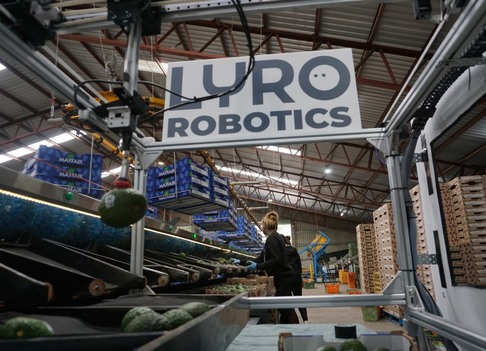
While the main focus is packing of the fruit, in this case, avocados, Dr Leitner says the robots can also perform other useful tasks for fresh produce companies, in terms of measuring volumes, weights and sizes. In addition, multiple packs can be sorted at the same time, depending on the end customer; whether it is food service, supermarkets, processing or home consumers.
"This information gathered by robots could be used by farmers to assess the quality of the produce on a daily basis," he said. "Those statistics could also be used in long term data gathering. We've already started conversations with companies in in-field precision agriculture, who can see the value in feeding this data all the way back. We can also provide downstream quality assurance services. In terms of assessing quality, one of the things that are relevant to the packing shed is that you usually pack different grades of avocados at the same time. Some have blemishes and you can't get the same value from them, as consumers buy with their eyes. So, while the quality is the same, one might be more visually appealing - with the robots you can pack multiple grades at the same time."
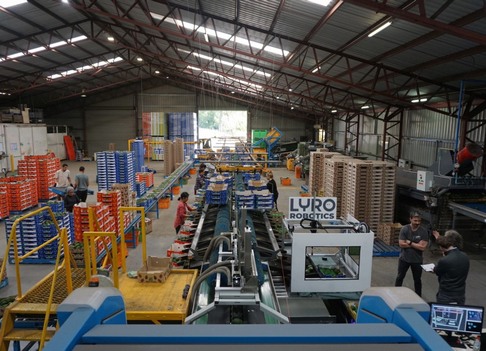
Another feature of the robots is that it can be used for traceability, such as printing QR Codes and sticking them on the fruit. This can then be used to track supply chain information such as time in storage, and the origin of the produce.
LYRO Robotics adds that a major advantage, having built the system themselves, is that the robots can be customised to the individual client company's needs. Dr Leitner says the technology behind it is not limited to specific produce or specific item meaning it can pack avocados, mangoes or even pharmaceutical items.
“The LYRO Machine Intelligence is a deep learning AI software system that integrates the brain, the eyes and the hands, enabling any robot to pick and pack any item, even if it has not seen it before," he said. "This allows us to change things around quickly. On the software side, we can provide additional quality inspection through a simple add-on. And on the hardware side, we can make adaptations such as adapting to the chute where the avocados come in and make it handle many different heights. At LYRO we have the system that fits perfectly into the existing setup. We strive for it to be retrofittable. To show how easily adaptable it is, Sunnyspot's neighbours brought over some limes and 10 minutes later the robot was packing the citrus."
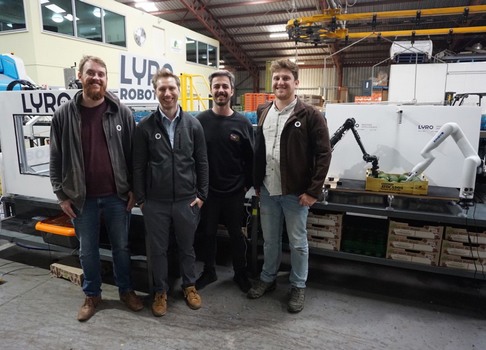
Director of Sunnyspot Packhouse and Sunnyspot Farms in Ravensbourne, Daryl Boardman, says he is a hands-on farmer but is "open to technology", and embracing innovation trials to ensure the business keeps moving forward.
"LYRO's team were keen to listen and adapt the software and robot parts to make them work in our shed," he said. "They will continually tweak the software and teach it what to do, and we're happy to have them trial their systems again next year. Whilst the speed and accuracy of the human workforce is essential to our business, LYRO’s robotics when working 24/7 can certainly complement our operations and keep up with our packing demands as the business evolves."
Mr Boardman established the business with his wife Sally 21 years ago and admits that they have not had major issues with labour-hire in the last decade, however, disruptions brought about through COVID-19 this year have changed that.
"We are pretty concerned for the next season as the COVID pandemic has affected the influx of additional labour from overseas, so more automation is needed in our business to adapt to these and any unforeseen staff changes,” Mr Boardman said.
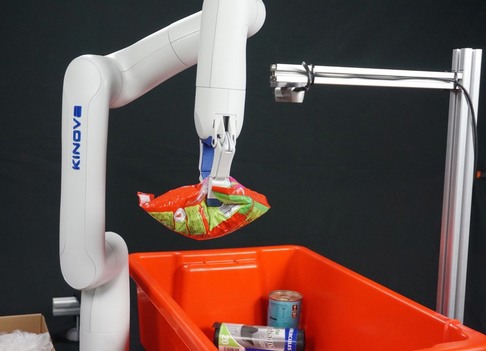
Dr Leitner added that a study by Ernst & Young for Horticulture Innovation Australia (released in September 2020) reported the gap between demand and supply of casual labour will result in up to 26,000 positions going unfilled in horticulture over the next nine months. He is hoping LYRO can help give companies some level of workforce security in the future.
“Another big advantage of robots is that they can work day or night, don’t need breaks, can work long hours and automate repetitive tasks," he said. "Robotics enables people to be up-skilled in technology, and at the same time robots can carry out jobs that humans won’t or are unable to perform. Our innovative robots and software can work in line with existing factory operations and automated systems across agriculture, horticulture, retail, logistics, warehousing as well as waste management sectors for picking, packing, and sorting to be all done contact-free. In fact, our vision is to have 100,000 robots out there by 2030 performing dirty, dull and dangerous manual tasks."
Since the COVID-19 outbreak, LYRO Robotics says it has experienced a steep increase in commercial interest for robotic solutions in food, e-commerce, warehouse and supply chain industries, and has been pleased with the commercial trials so far.
"What we are looking for is getting the robot out there at around 80-90 per cent, and working out what problems we can fix to get it to 100 per cent," Dr Leitner said. "We are now at the stage where the remaining 10 per cent is environment interaction in the actual packing shed. For us, the commercial trials have proven that even out of our own facilities we can set up and use the robotics quickly, in less than an hour, and that makes these systems more viable than larger models that require months of preparation or downtime."
The team is now finalising a round of venture capital to commercialise its picking and packing system with LYRO Machine Intelligence software. They have commercial partnerships already in progress, and five project proposals ready to go once more funding is secured.
For a video of the LYRO Robotics commercial trial at Sunnyspot Packhouse click here
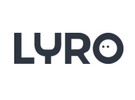 For more information
For more information
Dr Jürgen ‘Juxi’ Leitner
LYRO Robotics
Phone: +61 403 170 529
[email protected]
http://LYRO.io










